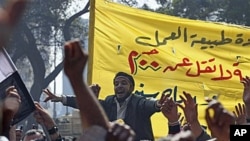The revolution in Egypt that ended with the resignation of its president on Friday has seen minimal coverage in Cambodia, especially as a heated border dispute between Cambodia and Thailand has dominated the news.
The huge shift in Egyptian and regional politics was overshadowed here by news of heavy fighting, including artillery shelling, over disputed land near Preah Vihear temple.
The limited coverage has meant “less information for the Cambodian people, where Cambodia and Egypt have a nearly similar situation,” said Ou Virak, executive director for the Cambodian Center for Human rights.
Egyptian President Hosni Mubarak stepped down after 18 days of anti-government demonstrations, relinquishing power he had held for 30 years and altering the political landscape of the Middle East.
The Egyptian demonstrations were sparked by a similar uprising in Tunisia in January and coincided with protests in other Arab countries, such as Yemen.
Prime Minister Hun Sen in a public address at the time warned against that kind of upheaval in Cambodia and threatened heavy retaliation for instigators.
But on Saturday, officials from the ruling and opposition parties said they welcomed the quiet resignation of Mubarak, whose departure put the military in charge of the country until elections can be held.
Cheam Yiep, a lawmaker for the ruling Cambodian People’s Party, said the resignation followed “the people’s will” and avoided major violence. A prolonged demonstration would have affected Egypt’s economic and social security, he said.
Opposition leader Sam Rainsy said the resignation would be a call to other countries unhappy with their leaders, including Cambodia.
“The world’s situation is now changing for countries that have bad leaders, that have corruption, joblessness and nepotism,” he said. “In the world, there are more than 200 countries making changes. But there are still two more countries [to go]. The first one is Yemen and the second one is Cambodia.”
Lao Monghay, a researcher for the Asian Human Rights Commission, echoed statements by UN Secretary-General Ban Ki-moon, who said the events in Egypt were a “lesson” to autocratic regimes.
“In Cambodia, if the leaders are not open for the freedom of expression, and if they are corrupt or have joblessness and economic inflation, then in the future there will be anger from the youth,” Lao Monghay said. “And then it will be like Tunisia and Egypt.”
As revelatory as the turnover in Egypt was, however, it was overshadowed in Cambodia by events along the Cambodian-Thai border, where heavy fighting was reported last week.
Pen Samithi, editor of the daily newspaper Reaksmey Kampuchea, said the news from Egypt was of low interest to Cambodians “when the war between Cambodia and Thailand” was being covered.
Information Minister Khieu Kanharith said media in Cambodia were “not afraid” to cover Egypt but that it had been covered “enough.”





